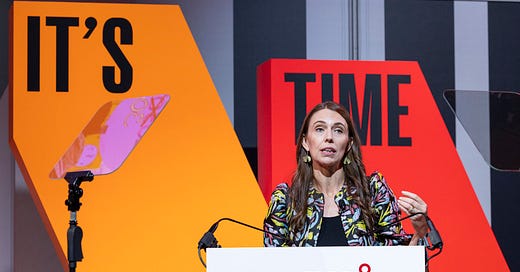Climate action must transcend geopolitical crises, Ardern tells NY climate week launch
“People expect politicians to get on with responding to the threats we all face, and that climate is being weaponised to divide people where it shouldn't.”
Former New Zealand prime minister Jacinda Ardern has used the launch of a major climate event in New York to urge world leaders to ensure commitments to tackle the worsening climate crisis transcend a volatile geopolitical environment.
In a keynote address to the opening ceremony of the 2024 New York Climate Week, Ardern argued that there was a general expectation across the global population that governments would accelerate action on climate change, despite increasingly partisan political environments and growing geopolitical challenges.
“Some will tell you that climate change has become too political, too polarised, and that is one of the reasons progress is too slow, but a 2024 UN Development Program study shows over 80% of the global population want their governments fighting the climate crisis faster,” Ardern told the event.
“This includes 73% in China, 77% in South Africa and India. 85% in Brazil, 88% in Iran, and up to 93% in Italy. An in the US, where the issue is perceived as hyper partisan, 66% of people still wanted more movement more quickly.”
“Now these numbers tell us two things that at its core, people expect politicians to get on with responding to the threats we all face, and that climate is being weaponised to divide people where it shouldn't,” Ardern added.
“The UN Development Program survey also showed it's not just domestically that people expect us to crack on. 86% of people want to see their country set aside geopolitical differences and work together on climate change.”
Ardern addressed the New York Climate Week event that coincides with the gathering of a large number of world leaders and heads of government at the United Nations General Assembly, also in New York. Conflicts across the Middle East and the ongoing Russian Invasion of Ukraine are expected to dominate those talks.
In an earlier address to the New York Climate Week event, senior climate advisor to United States president Joe Biden, John Podesta, highlighted the potential for the climate crisis to fuel fresh domestic and geopolitical challenges for leaders.
“July 22 of this year was the hottest day ever recorded by humans. And we're seeing the consequences of a rapidly warming planet every day here in the United States, tropical storms and hurricanes pummel the Gulf and East Coast,” Podesta said.
“People in Phoenix, Arizona experience more than 100 days with heat over 100 degrees Fahrenheit this summer, and wildfires, of course, continue to rage out West.”
“Almost a million people have been displaced from their home by rains and floods in Nigeria, Mali and Niger and flooding in Central Europe has claimed at least 22 lives over the past week and a half,” Podesta added.
In comments addressed to world leaders, Ardern pointed to a history of successful international collaboration that has been achieved between nations on the protection of the environment of Antarctica, amongst prior geopolitical crises.
“The world is hardly presenting itself as unified on anything at present, there is a devastating war in Europe and in the Middle East. There is debate over things that felt previously agreed, like the Sustainable Development Goals,” Ardern said.
“Geopolitical disputes are playing out at just about every quarter of foreign policy, but we have been here before, and we have risen above it before too, and in a place critical to the climate challenge, Antarctica.”
“Antarctica has always been a place where politicians, diplomats and civil society have risen above the geostrategic disputes of the day,” Ardern said.
Ardern expressed optimism that prior successes in reaching international agreements to manage the environment of Antarctica provided an example of what could be achieved with respect to climate change, in a currently volatile geopolitical environment.
“In 1959 in the midst of the Cold War, amongst Soviet demands for troops to be removed from Berlin and the fallout of the Cuban Revolution, the US, Soviet Union and 10 other nations signed the Antarctic Treaty, safeguarding Antarctica for scientific research and outlawing military bases or operations there.”
“Historically, we have all been Antarctica's only defence, and the time has come to be that again,” Ardern added.
Ardern served as the prime minister of New Zealand during a period when the country adopted an ambitious set of climate policies, which included legislating a commitment to a net zero carbon target, the creation of an independent climate commission and introducing some of the world’s first mandatory climate reporting obligations.
Shortly before retiring from politics, Ardern had proposed the introduction of a levy on agricultural emissions, after attracting scrutiny for adopting a soft approach on agricultural methane emissions – which represent around half of New Zealand’s emissions footprint.
Since leaving politics, Ardern was appointed as a trustee of the Earthshot Prize, an initiative launched by Prince William and which awards prizes for potential solutions to climate change and other environmental challenges.





